Really? How long's a piece of string? What you ask is so vague it's unanswerable without guessing.Hello,
I want to learn how an Operating System work and I guess BSD is clear and simpler than other OSes like GNU/Linux and Windows OS. I want to change some parts of source codes and recompile them and see the result in the OS. Which version of BSD is simpler for my goal?
Thank you.
Hello,
I want to learn how an Operating System work and I guess BSD is clear and simpler than other OSes like GNU/Linux and Windows OS. I want to change some parts of source codes and recompile them and see the result in the OS. Which version of BSD is simpler for my goal?
Thank you.

Which steps I must do?
I downloaded the all the files in that URL and wanting to compile and make that OS. How can I do it?To archive what?
What platform are you using now? You would find it hard to locate hardware that suits 1.0-R. Your best bet is a virtual system, but I suspect even that would be a tricky manoeuvre.Thank you so much for all replies.
I want to download and compile FreeBSD version 1 from ftp://ftp-archive.freebsd.org/pub/FreeBSD-Archive/old-releases/i386/1.0-RELEASE. Which steps I must do?
I downloaded the all the files in that URL and wanting to compile and make that OS. How can I do it?
What do you expect to learn from compiling an existing OS? You will not learn how it works, or how to write one. Before you can learn that, you need to get pretty darn good at programming, and computer architecture. I took an OS class about 40 years ago. The first semester was about computer architecture (Burroughs 5000, PDP-11, IBM 360, CDC 6600), instruction sets, and assembly programming. We learned things like implementing semaphores and mutexes in IBM 360 assembly language, and doing IO using the PP on the CDC. Clearly, that is for hardware that is not relevant any longer. If you really want to learn about how an OS works, start by understanding how to program an x86 processor, how memory and IO works. Then start reading the source code.I downloaded the all the files in that URL and wanting to compile and make that OS. How can I do it?
Is it about building OS?hack3rcon Have you looked at The Developer's Handbook?
I know that I need an old PC. I want to use Xen or VirtualBox for it, but can I compile this version of FreeBSD using a moden Linux Distro?What platform are you using now? You would find it hard to locate hardware that suits 1.0-R. Your best bet is a virtual system, but I suspect even that would be a tricky manoeuvre.
Unless you have the hardware to match the software it's a chicken and egg situation if you want to compile it.
I would guess your ONLY option is to install FreeBSD 1 on a virtual machine and then muck around in /src/sys.
I want to use Xen or VirtualBox for it
but can I compile this version of FreeBSD using a moden Linux Distro?
@hack3rcon How much are you familiar with computer and programming and why you want to learn OS internals?
@hack3rcon Have you looked at The Developer's Handbook?
Is it about building OS?
Gee. I don't know. How would we ever find out?Is it about building OS?
First you have to install it. Then you can boot it and compile it with itself. You cannot compile FreeBSD under Linux or anything else.Thank you so much for all replies.
I want to download and compile FreeBSD version 1 from ftp://ftp-archive.freebsd.org/pub/FreeBSD-Archive/old-releases/i386/1.0-RELEASE. Which steps I must do?
I read somewhere it's possible, but couldn't remember where, vermaden's Valuable News 2020/10/26 reminded me where it was:You cannot compile FreeBSD under Linux or anything else.
...
As of September 2020 it should be possible to use the buildworld and buildkernel make targets
to build afully-functional FreeBSD installation on macOS and Linux hosts.
...